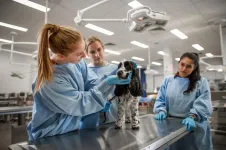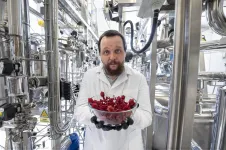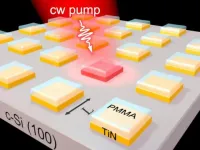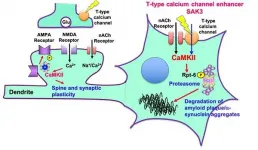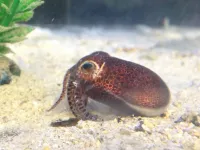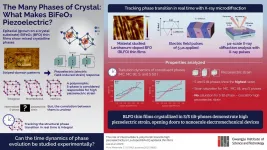(Press-News.org) Receiving a simple thank you, spending time with peers and further developing their expertise, are all factors that make veterinarians feel good at work, according to a new study by researchers at the University of Adelaide.
In the study published by Vet Record, researchers investigated the positive side of veterinary work and specifically what brings vets pleasure in their job.
Lead author Madeleine Clise, a psychologist and Adjunct Lecturer at the University of Adelaide's School of Psychology says: "At a time in Australia when there are national shortages of vets, particularly in regional areas, and increased publicity about the risks and challenges in the profession, it's important to focus on what can be done to retain those in the profession and attract more people to the field.
"By focusing on what contributes to vets experiencing positive emotions, we can better understand how to improve wellbeing of those who care for our beloved pets, livestock and wildlife."
In a questionnaire completed by 273 Australian veterinarians, participants were asked to provide up to 10 responses to the prompt, 'I derive pleasure from my work as a veterinarian when...'. Over 2500 responses were grouped into themes and sub-themes and categorised using the 'Job Demands-Resources Model', which focuses on both the positive and negative aspects of a job that are indicative of employee wellbeing.
"The results highlight that there is an abundance of factors related to pleasure at work for veterinarians, above and beyond working with and helping animals," Ms Clise said.
"In fact, positive relationships between clients and vets, and vets and their colleagues, was a more frequent response than positive relationships with animals.
"Vets, just like all of us, feel good when they are shown trust and respect. And a simple 'thank you' goes a long way."
Other findings from the study suggest that having opportunities to use and develop their specialised skillsets is highly pleasurable for veterinarians in practice. A positive workplace culture, successful outcomes with patients and opportunities to collaborate with other vets were also highlighted.
Senior author Dr Michelle McArthur, Associate Professor at the University of Adelaide's School of Animal and Veterinary Sciences, says: "Managers and practice managers can use the results to enhance the work environment for employees.
"This could include introducing an informal and formal recognition system and increasing time spent with colleagues.
"Further beneficial changes could include the introduction of a peer supervision or mentoring program to support veterinary expertise and increase connectedness across the profession."
The results also showed experiencing certain positive beliefs about oneself, such as flexibility, having a positive attitude and accomplishment are associated with pleasure at work.
"So further developing personal resources, for example in the university curriculum or as ongoing professional development, could increase the overall wellbeing of veterinarians," said Dr McArthur.
The researchers hope the results will spark discussion and further focus on the positive aspects of veterinary work, which they say are often overshadowed by the negative.
"Veterinarian work is such a rewarding profession and it's important that we share the many positives with new veterinarians and those in training as reassurance, and to encourage others to join the profession," said Dr McArthur.
INFORMATION:
Prolonged exposure to antibiotics leads to the gain of bacteria's ability to defeat the drugs designed to fight them. Thus, if such antibiotic-resistant bacteria cause the infection, the only chance to use a specialized virus called phage infecting specific bacteria species. It is a powerful weapon against deadly diseases. At the same time, the effective treatment depends on factors that would not be suspected for years to impact the successful therapy. Recently, researchers from the Institute of Physical Chemistry, Polish Academy of Sciences led by dr. Jan Paczesny and Professor ...
Tsukuba, Japan - Depression is a worldwide problem, with serious consequences for individual health and the economy, and rapid and effective screening tools are thus urgently needed to counteract its increasing prevalence. Now, researchers from Japan have found that artificial intelligence (AI) can be used to detect signs of depression.
In a study published this month in BMJ Open, researchers from University of Tsukuba have revealed that an AI system using machine learning could predict psychological distress among workers, which is a risk factor for depression. ...
Atomic nuclei contain enormous energy that can be extracted through their fission mechanism, for example, as a result of the radioactive decay of uranium or plutonium nuclei. Likewise, a quantum of light of several electron-volts (2.4 eV in a laser pointer with a green beam) has colossal energy. If all photons were absorbed by matter, then its temperature could reach several thousand degrees. However, in practice this does not happen. The reason is the weak light-matter interaction due to the fact that the wavelength of light (500 nm) is a thousand times larger than the size of an emitting / absorbing atom (0.5 nm). It is this physical mechanism that prevents the destruction of matter when illuminated. The efficiency of light absorption increases ...
Researchers have identified a new treatment candidate that appears to not only halt neurodegenerative symptoms in mouse models of dementia and Alzheimer's disease, but also reverse the effects of the disorders.
The team, based at Tohoku University, published their results on June 8 in the International Journal of Molecular Sciences. The treatment candidate has been declared safe by Japan's governing board, and the researchers plan to begin clinical trials in humans in the next year.
"There are currently no disease-modifying therapeutics for neurodegenerative disorders such as Alzheimer's disease, Lewy body dementia, Huntington ...
As our society and transportation systems become increasingly electrified, scientists worldwide are seeking more efficient and higher capacity storage systems. Researchers at KAUST have made an important contribution by modifying lithium-sulfur (Li-S) batteries to suppress a problem known as polysulfide shuttling.
"The bottleneck in the utilization of renewable energy, especially in transportation, is the need for high-density batteries," says Eman Alhajji, Ph.D. student and first author of the research paper.
Li-S batteries have several potential advantages over ...
Bobtail and bottletail squids are tiny marine invertebrates that are found throughout the world's oceans and are useful model animals for research
There are 68 recognized species of bobtail squid and five recognized species of bottletail squid, but the timing of their divergence from one another is still relatively unknown
Researchers at OIST, Hiroshima University and the National University of Ireland Galway, collected 32 species of bobtail and bottletail squids
They looked at the genetic variations across the entire genomes of these species to estimate their evolutionary relationships
The results showed that the divergence of these species aligned with major ...
Tel Aviv University's groundbreaking technology may revolutionize the treatment of cancer and a wide range of diseases and medical conditions. In the framework of this study, the researchers were able to create a new method of transporting RNA-based drugs to a subpopulation of immune cells involved in the inflammation process, and target the disease-inflamed cell without causing damage to other cells.
The study was led by Prof. Dan Peer, a global pioneer in the development of RNA-based therapeutic delivery. He is Tel Aviv University's Vice President for Research and Development, head of the Center for Translational Medicine and a member of both the Shmunis School of Biomedicine and Cancer Research, George S. Wise Faculty ...
What if electricity could be squeezed out of something? It turns out some materials have this property. Piezoelectricity is the electric charge that accumulates in certain solids when mechanical stress is applied on them. Piezoelectric materials, like bismuth ferrite thin films, when grown on a single lanthanum aluminate substrate give rise to highly strained epitaxial thin films that exhibit excellent electromechanical and ferroelectric properties. In bismuth ferrite thin films "doped" or polluted with lanthanum (BLFOs), piezoelectricity is attributed to the presence of "mixed-phase structures" with stripe patterns.
The formation of stripe patterns and controlling the mixed-phase structures of BLFO have been the ...
A FLEET theoretical study out this week has found a 'smoking gun' in the long search for the topological magnetic monopole referred to as the END ...
HARWELL, UK (29 June 2021) Researchers working on the Faraday Institution project on the recycling of lithium-ion batteries (ReLiB) at the Universities of Leicester and Birmingham have solved a critical challenge in the recovery of materials used in electric vehicle batteries at the end of their life, enabling their re-use in the manufacture of new batteries. The new method, which uses ultrasonic waves to separate out valuable material from the electrodes, is 100 times quicker, greener and leads to a higher purity of recovered materials relative to current separation methods.
The research has been published in Green Chemistry and the team have applied for a patent for the technique.
To ...
